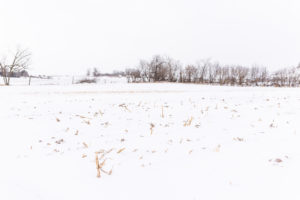Winter Alfalfa Management
February 22, 2022
With winter in full swing, it is the time on the farm when we begin to plan for the coming crop year. For many, it begins with a review of the past year’s successes and a look forward to how those things can be replicated. If you have significant acres of alfalfa in your rotation, your alfalfa crop offers tremendous nutrient credits for subsequent crops. For example, a good alfalfa stand with more than eight inches of growth before termination can provide an average of 150 pounds of N, while a fair stand can still provide an average of 110 pounds of nitrogen. With the expense of establishment, care should be given to understand the optimal time to terminate or keep a stand to maximize the return from such costs.

Many factors can affect the longevity of an alfalfa stand, perhaps the most relevant this time of year is winter injury. While there is not much a producer can do to change the severity of harsh wither weather, variety selection goes a long way and Legacy alfalfa has excellent winter hardiness to suit the varying production zones of Michigan. Fall dormancy can play a role in winter injury as well. If too long of a fall dormancy is selected, the plant can break dormancy on warm days early in the spring when frost is still a threat. If it breaks dormancy and frost sets in again, the buds that were formed in the fall can be killed and the plant will be slow to grow in the spring. By contrast, if too short of a fall dormancy is selected yield will be sacrificed in the fall as the plant begins to shut down earlier than optimal based on day length. Fortunately, Legacy Alfalfa is designed to hit this optimal window of fall dormancy for maximum yield.
A lot can be understood by looking at the roots of an alfalfa plant. It is a common understanding that good healthy alfalfa roots will be white on the inside and firm. If alfalfa fields are slow to regrow in the spring, or have uneven growth, you need to assess stand health. Roots that have a crack in the crown, evidence of decay or being brown or soft all have a lessened ability to produce to their potential and have a low likelihood of making it through another winter. The threshold where alfalfa can produce at its full potential is at or greater than 55 stems/sq. ft. This evaluation should be taken when the plants are growing. It is recommended to replace a pure alfalfa stand when the stem density reaches less than 40 stems/sq. ft.
While some winter damage is inevitable there are some management practices that can be implemented to help reduce plant stress throughout the season and let the plant build up root reserves to be more resilient. Dan Undersander, University of Wisconsin Extension shares a few tips:
- Allow plants to mature longer before harvest. For example, instead of harvesting at 10% bloom, harvest at 50% bloom.
- Increase cutting height; If the plant has new shoots developing at the base cutting higher will avoid damage to the shoots. If these shoots get damaged the plant will require more energy to make new ones.
- Fertilize to recommended rates to give the alfalfa plants the necessary resources to remain strong.
- Control weeds to ensure alfalfa plants are getting all available resources.
While these were some tips on evaluating the life of a current stand, you can count on Legacy alfalfa to achieve your goals for a high yielding, disease tolerant, and long-lasting in your new alfalfa fields. Within the line-up of premium alfalfas, we have a variety to suit all Michigan alfalfa producers. If intensive harvest schedule with quick regrowth is a priority, count on L-470 HD to get it done. For a variety with good performance in wetter soils, L-451 APH2+ is the one. L-451 APH2+ also features the branch rooted trait with a sunken crown. With the sunken crown below the soil surface, this variety is more resilient to wheel traffic and can better withstand winter damage to the root from frost heaving.
Contact Darren Kulicamp by phone at: (616) 238-5206 or by email at: darren@dfseeds.com for help evaluating your stand and finding which Legacy Alfalfa may be right for your farm.

